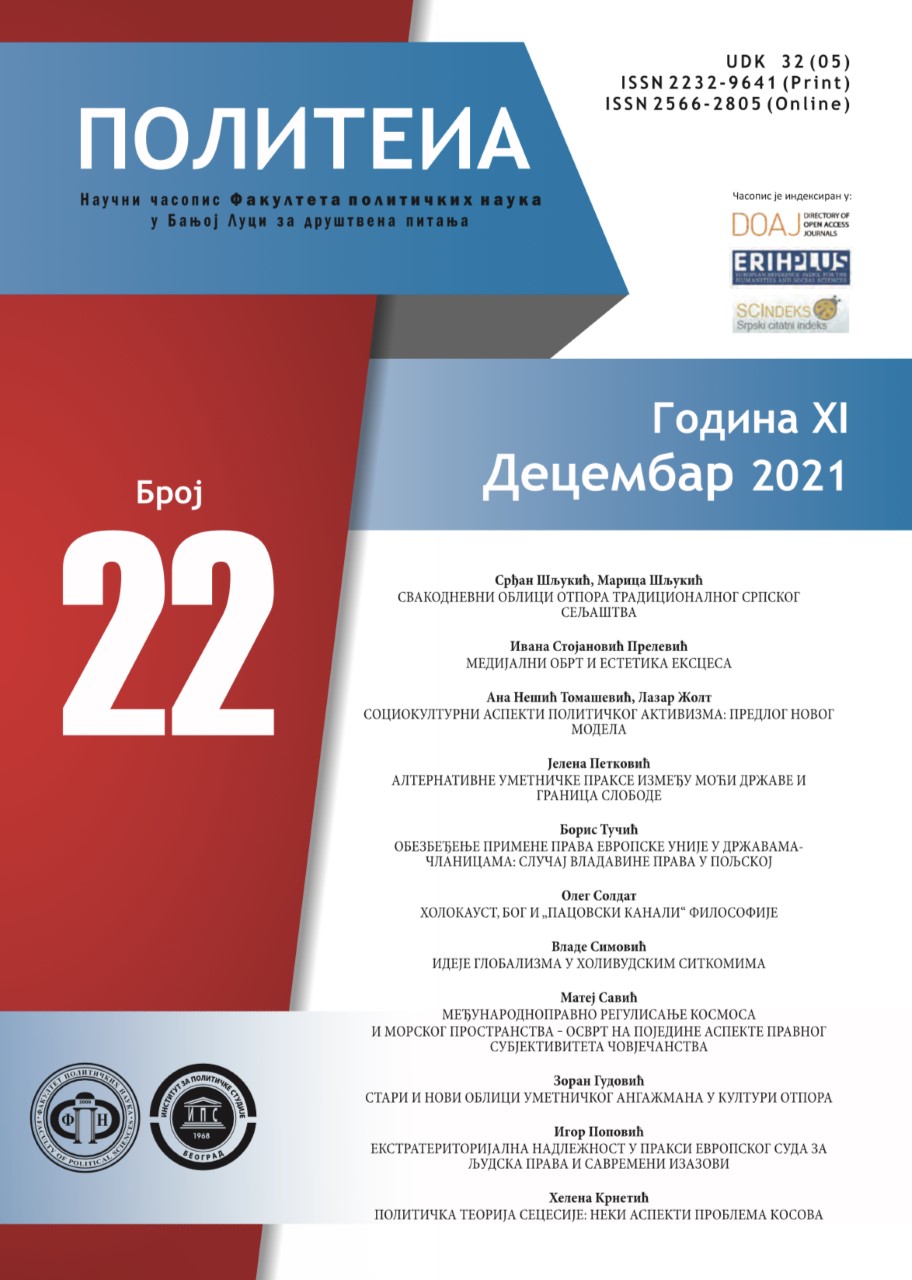HOLOCAUST, GOD AND THE 'RAT LINES' OF PHILOSOPHY
Abstract
The subject of this paper concerns two mechanisms wich help philosophy to circumvente the subject of Holocaust. These are: the philosophy of Heidegger and the neo-marxists tenets of so called Frankfurt School, especially those of Theodor Adorno. While Heidegger is seen in this paper as a resulting prioritization of chtonic symbolism within the the culture of Wiemar Germany, which pushes out the alternative of Ernst Cassirer, the leftist matrix of Adorno’s thought is equally seen as a distancing paradigm that abolishes Biblical language, through metaphysics. Paper investigates in some details these mechanisms which aim at abolishing strategic solutions of both Jewish nation and Holocaust – in the package of Zionist ideals. Author sees philosophical fixation on generic trajectoria of man-as-species, as a way of devious handling of the specifics of the Jewish existence.
References
Аутор, (2019). Потешкоће у семиози светих новомученика:Ћопић у потрази за Јасеновцем: 79-99. У Зборнику радова: Новомученици: Полиперспективе I, Ћулибрк, Београд: Музеј жртава геноцида.
Agamben, Giorgio (1998). Homo Sacer: Omnibus. Stanford University Press.
Aarons, Mark and Loftus, John (1991). Ratlines: How the Vatican's Nazi Networks Betrayed Western Intelligence to the Soviets. New York: St. Martin's Press.
Adorno, Theodor and Horckheimer, Max (2002). Dialectics of Enlightment. Stanford University Press.
Adorno, Theodor (2004). Negative Dialectics. London and New York: Rautledge.
Braiterman, Zachary (1997). Fideism Redux: Emil Fackenheim and the State of Israel. Jewish Social Studies, New Series, Vol. 4, No. 1 (Autumn, 1997), pp. 105-120.
Balthasar, von Urs (1998). Apokalypse der Deutschen Seele: Studien zu Einer Lehre von Letzen Haltungen. Freiburg: Johannes Verlag Einsideln.
Balthasar, von Urs (1998). Apokalypse der Deutschen Seele: Studien zu Einer Lehre von Letzen Haltungen. III. Die Vergöttlichung des Todes. Freiburg: Johannes Verlag Einsideln.
Cohn, Norman (1970). Pursuit of Millenium, Oxford University Press.
Cohen, Arthur (1993). The tremendum: a theological interpretation of the Holocaust. New York: Continuum.
Derrida, Jacques (1974). White Mythology: Metaphor in the Text of Philosophy. New Literary History, Vol. 6, No. 1 (Autumn, 1974), pp. 5-74.
Ezrahi, Sidra DeKoven (1995). Representing Auschwitz. History and Memory, Vol. 7, No. 2 (Fall-Winter): pp. 121-154.
Fackenheim, E. L. (1985). The Holocaust and Philosophy, The Journal of Philosophy, Vol. 82, No. 10: pp. 505-514.
Flowers, Stephen E. and Moynihan, Michael (2007). The Secret King: the Myth and Reality of Nazi Occultism. Dominion Feral House.
Gordon, Peter (2010).Continental Divide: Heidegger, Cassirer, Davos. Harvard University Press: Cambridge, Massatchusets, London, England.
Goodricke-Clark, Nicholas (1993). The Occult Roots of Nazism: Secret Aryan Cults and Their Influence on Nazi Ideology.
Gombrich, E.H. (1986). Aby Warburg: An Intellectual Biography. University of Chicago Press.
Hilberg, Raul (1985). The Destruction of the European Jews. Holmes & Meier Publishers, Inc.
Hirsch, David, (1991). The Deconstruction of Literature: Criticism after Auschwitz. Hanover : University Press of New England.
Marx, Karl (1954). A World Without Jews (ed. by Dagobert D. Runes). New York: Philosophical Library.
Slezkine, Yuri (2004). The Jewish Century. Princeton University Press.
Schindler, Pesach (1990). Hasidic Response to Holocaust. KTAV Publishing house.
Sholem, Gershom (1976). On Jews and Judaism in Cricis: Selected Essays. New York: Schocken Books.
Trevor-Roper, H.R. (intr.) (2000), Hitler’s Table Talk: 1941-1944. His Private conversations. New York City: Enigma Books.
Voegelin, Eric (1997). Science, Politics and Gnosticism. Regnery Publishing, Inc.
Voegelin, Eric (1999). Modernity Without Restraint: The Political Religions, The New Science of Politics, and Science, Politics, and Gnosticism. University of Missuri Press.
Autori koji objavljuju u ovom časopisu pristaju na sljedeće uslove:
- Autori zadržavaju autorska prava i pružaju časopisu pravo prvog objavljivanja rada i licenciraju ga "Creative Commons Attribution licencom" koja omogućava drugima da dijele rad, uz uslov navođenja autorstva i izvornog objavljivanja u ovom časopisu.
- Autori mogu izraditi zasebne, ugovorne aranžmane za neekskluzivnu distribuciju članka objavljenog u časopisu (npr. postavljanje u institucionalni repozitorijum ili objavljivanje u knjizi), uz navođenje da je članak izvorno objavljen u ovom časopisu.
- Autorima je dozvoljeno i podstiču se da postave objavljeni članak onlajn (npr. u institucionalni repozitorijum ili na svoju internet stranicu) prije ili tokom postupka prijave rukopisa, s obzirom da takav postupak može voditi produktivnoj razmjeni ideja i ranijoj i većoj citiranosti objavljenog članka (Vidi Efekti otvorenog pristupa).

